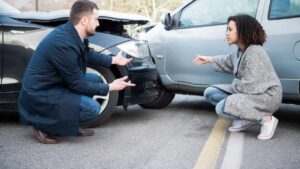
If you were involved in a car accident, staying at the scene is always in your best interest, even if there are no injuries. Indiana’s laws require you to remain and exchange information with the other parties involved and report the accident to law enforcement. Failing to do so can lead to criminal charges, fines, and potential driver’s license suspension.
At Vaughan & Vaughan, we want to empower our clients to make informed decisions. Our legal team will offer you all the data you need to decide your next steps. If you were in a crash, an Indianapolis car accident lawyer will recommend that you stay at the scene, call the police, and exchange information with those involved in the incident. Call us today for a free consultation.
Can You Leave the Scene of a Car Accident in Indiana?
In Indiana, it is illegal to leave the scene of a car accident without stopping and providing the necessary information and reasonable assistance to the other parties involved. This is known as a hit-and-run offense and can result in serious consequences.
After a car crash, Indiana law requires you to:
- Stop the car at or near the crash location
- Exchange information with the other drivers or those involved in the collision
- Assist injured victims, if possible
- Report the incident to the police
By stopping at the accident scene, you can ensure that everyone involved receives the necessary medical attention and that the accident is properly reported to the authorities.
Additionally, stopping at the scene allows you to gather important information and evidence that may be crucial for insurance claims or legal proceedings. It is always in your best interest to stop at the crash scene and fulfill your legal responsibilities.
Your Case Will Get
The Attention It Deserves

Why You Should Not Leave the Scene Even if Nobody Were Injured
While it may be tempting to think that no harm was done and that you can drive away, it is in your best interest to stop and stay at the scene until law enforcement arrives. Under Indiana law, you must stop, exchange information with the other parties, and report the accident to law enforcement.
In addition, what may initially seem like a minor accident can sometimes have hidden injuries or damages that may not be immediately apparent. Leaving could deprive those involved of the opportunity to seek medical attention or properly assess the extent of damages.
It May Be Illegal
Every state has different laws and regulations about leaving a car accident scene. What you are expected to do often depends on the crash details, but it is always a safe bet to stop your vehicle and stay at the scene, even after a seemingly minor collision.
Under the Indiana Code, 9-26-2-4 Sec. 4, a law enforcement officer must evaluate the severity of a car accident to determine if it resulted in injuries, death, or property damage. The responding officer will fill out a report with the details of the incident.
Injuries Are Not Always Immediately Visible
In many cases, the adrenaline rush following a collision can mask the pain or discomfort resulting from injuries, and their symptoms may only become apparent hours or even days later. By staying at the scene and ensuring that all parties involved are medically evaluated, you can prevent potentially serious injuries from going undetected and untreated.
Common car accident injuries that may not be immediately apparent include:
- Whiplash
- Concussion
- Brain injuries
- Internal injuries
- Soft tissue injuries
By staying at the scene, you can help establish a clear record of the accident, which can be essential for insurance claims and legal matters that may arise later. Leaving prematurely not only compromises the well-being of those involved but also hampers the accuracy of accident reports and complicates seeking compensation for damages.
Document the Scene
Documenting the scene provides crucial evidence for insurance claims and potential legal proceedings. This documentation establishes a clear record of what transpired and who was involved, helping to determine liability accurately and ensuring a fair and swift resolution of any disputes that may arise.
You can document the car accident scene by:
- Exchanging information with the other parties involved
- Collecting witness statements
- Taking photographs of the accident scene and vehicle damage
- Noting weather and road conditions
- Recording the time and date of the accident
Leaving can hinder this documentation process, making it more challenging to assert your rights and protect your interests in the aftermath of the accident.
You Might Need the Police Report
This report can serve as crucial evidence in insurance claims and legal proceedings that may follow the accident. It provides an objective account of what transpired, helping to establish liability and determine fault accurately.
What Are the Consequences of Leaving the Accident Scene?
Leaving a car crash scene can result in criminal charges, including hit-and-run offenses, leading to fines, probation, and even jail time, depending on the circumstances. In addition, leaving the scene may result in your driver’s license being suspended.
Beyond legal penalties, not staying at the scene can also harm your insurance premiums and coverage. Insurance companies typically view hit-and-run accidents as higher-risk situations. As a result, your insurer may raise your premiums significantly, making your car insurance more expensive.


Speak to a Car Accident Lawyer Before Leaving the Scene
Before deciding to leave the scene of a crash in Indiana, consult a lawyer. Car accident lawyers can provide invaluable guidance on navigating the situation correctly. They will inform you of your rights and responsibilities, help you understand the potential legal consequences, and advise you on the best course of action.
Speaking to a car accident lawyer before leaving the scene can help you make informed choices that protect your interests and ensure compliance with the law. At Vaughan & Vaughan, we are available 24/7 to serve those in need in Indiana. Contact us today if you have further questions.





